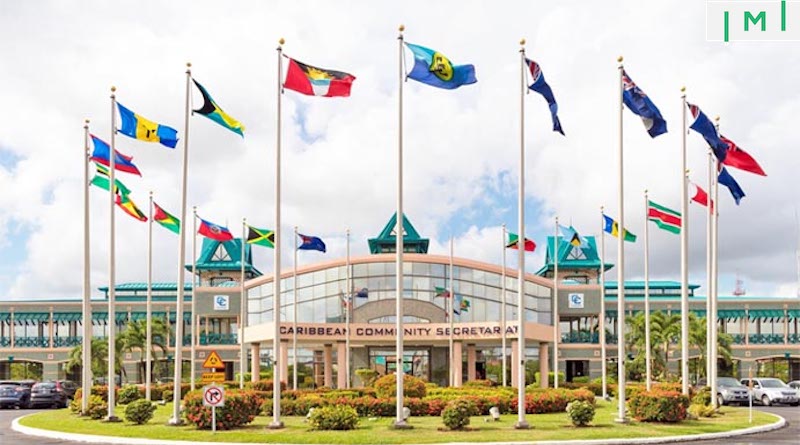Caribbean PMs Agree to “6 CBI Principles” Proposed by US Govt, Full Suspension of Russians From March 31st
The Caribbean states of Antigua & Barbuda, Dominica, Grenada, St Kitts & Nevis, and St Lucia held a roundtable discussion with US officials led by the Deputy Assistant Secretary of the US Department of the Treasury on the 25th of February to discuss the challenges and threats faced by the Caribbean Citizenship by Investment Programs (CIPs), according to an OECS press release.
All of the Caribbean states’ Prime Ministers and Citizenship by Investment Unit (CIU) heads were in attendance, alongside other relevant members of their parties, as they engaged in what was described as a “frank discussion” with a number of US government officials regarding certain specifics of their CIPs.
The meeting, which took place in St Kitts & Nevis, concluded with the “Caribbean Five” agreeing to six significant stipulations for their CIPs as proposed by the Americans:
- Collective agreement on the treatment of denials: Not to process applications from persons whose applications have been denied in another CIP jurisdiction by proactively sharing information on denials.
- Interviews: Conduct interviews with applicants, whether virtual or in-person.
- Additional checks: Each jurisdiction will run checks on each application with the Financial Intelligence Unit of its respective country.
- Audits: Audit the programs annually or every two years in accordance with internationally accepted standards.
- Retrieval of passports: Request law enforcement assistance in retrieving revoked/recalled passports.
- Treatment of Russians and Belarusians: Suspend processing applications from Russians and Belarusians. Four jurisdictions have already suspended applications, and Grenada, which processes applications from Russians and Belarusians, with enhanced due diligence, will suspend processing new applications from Russia and Belarus from the 31st of March, 2023.
The attendees agreed to convene a technical discussion to assess the status of implementing these new principles within the next four to six months.
Addressing the issue, Antigua & Barbuda’s Prime Minister Gaston Browne explained that a key American request had been to stop Russian participation in the programs: “I believe there is one country processing Russian and Belarusians […] In any case, we huddled, and there’s a consensus now that we will not process these applications.”
For most of the last year, Grenada has been alone among Caribbean CIPs to accept Russian and Belarusian applicants, a controversial decision but one that has seen its program garner record revenues.
Browne went on to highlight that the agreement to the six proposed principles, while unanimous among the Caribbean states, was an inevitable outcome considering the always-present (but rarely uttered) threat of US sanctions: “If we try to buck them and use the issue of sovereignty, all they have to do is issue a sanction stopping us from using the banking system, and then we are in trouble.”
The Antiguan PM, who has publicly spoken about the US’ critical stance on Caribbean CIPs and highlighted the dangers posed to Caribbean CIPs by global superpowers, emphasizing issues such as de-risking, which could stunt the economic development of smaller nations, acknowledged that the specter of US financial sanctions had left the Caribbean states” little choice but to cooperate and collaborate.”
Washington will put in a good word with Brussels
The joint press release made clear that the Americans recognized that the Caribbean CIPs provided “a legitimate service and have assisted in the survival of the participating economies” and, furthermore, that such revenues had been “invaluable” in making the Eastern Caribbean states more economically resilient in the face of natural disasters and other external shocks.
The conclave also agreed to acknowledge that the dismantling of the region’s CIPs would “severely compromise the prosperity and prospects of the countries, triggering a plethora of negative social consequences domestically and potentially leading to an upsurge in criminality, among other pathologies.”
This culminated in the agreement of both parties affirming their commitment to a collective fight to safeguard their respective financial systems against threats posed by illicit actors.
According to the joint statement, the CBI states have requested that the Americans assist in facilitating a similar agreement on the same six principles also with the EU and the UK
The joint declaration arguably improves the long-term sustainability of the Caribbean CIPs, as it sets a tone of cooperation rather than intimidation. While the changes may have adverse effects on the program, they will alleviate much of the program-related pressure from the US and – by extension – the OECD and EU.
The Caribbean states also made proposals of their own, requesting further discussion on the US Government’s risk management framework for the EB-5 Immigrant Investor Program as it relates to processing applications from Russians. The irony of the US requesting that Caribbean states ban Russians and Belarusians from their CIPs while the American government continues to process them under its EB5 program was not lost on Browne: “Many of these Russians and Belarusians we would have processed have never come here. So, they don’t have any interest in coming here and going to the US in the first instance, so the risk is less. So, we see the contradiction.”
Ahmad Abbas is Director of Content Services at Investment Migration Insider and an 8-year veteran of the investment migration industry.



